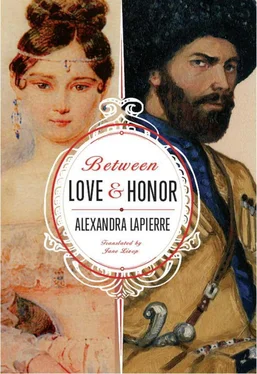How could the survivors resist the invaders when, two years ago, such valiant warriors as Khazi Mullah, the first imam, and Shamil, who was then his lieutenant, had not been able to?
The Russians had decimated their ranks with weapons unknown to the village. They had blown up the mountain, dug into the cliffs with explosives, and climbed vertically from one ledge to the next, hoisting their cannons with pulleys and winches from one level to the next. Their soldiers had dropped like flies under fire from Shamil’s troops, and they had suffered great losses, but no matter. As the casualties fell, others took their places. The Russian army had an unlimited reserve of officers, soldiers, and serfs. Shamil said they had tens of millions of slaves.
So the war was lost before it had ever even started, the hypocrites argued today, and for a dreadful reason: it violated the Koranic proscription to combat an enemy superior in number. Shamil and his men were four hundred against thirty thousand. Thirty thousand Russians had swept down upon these boulders, spreading death and devastation. And since then, the corn and the barley no longer grew in the small fields and the children cried with hunger. The rocks had turned the color of ashes, and no wind or rain washed them clean. The soot that coated everything formed a dark, greasy layer over the snow. Was this the victory God conferred upon those who served Him?
Day by day the rumors swelled. Shamil was not one of the chosen. He was weakening Islam. He displeased God.
In the silence of the night, Bahou-Messadou could no longer ignore their words, and she wondered. To her son, resisting the Russians was all about crushing everyone who opposed the holy war. But wasn’t this fight against the teachings of the Koran?
Allah have pity on Bahou-Messadou’s presumptuousness! How could she, an old, ignorant woman, dare to think such thoughts when Shamil was opening the path to Salvation?
And yet, she was incessantly tortured by doubt. She prayed for the pardon of her son and the pardon of Allah; she did penitence by carrying burdens that crushed her body and spirit. She brought the water from the ravine and pushed and dragged loads of earth and stones far too heavy for her for the reconstruction of Ghimri. She worked in the fields and did all the domestic chores that the men of the clan would not lower themselves to do, repeating the gestures for which Allah had created her. The men had their weapons; their role was to live up to the honor of fighting and killing and dying courageously. Hers was to lighten their woes and support them on their journey through life.
Bahou-Messadou walked past the ruins of the old well that the Russians had poisoned by throwing carrion and cadavers down it, past the watchtowers and the first courtyard. As always when she neared the village, she held her head high. She tried to straighten up fully, and God punished her for her pride. She bumped into a rock. The jug slid from her shoulder, and she hadn’t the strength to hang on to it. The ewer clattered onto the ground, the copper clanking over the rocks. She rushed to pick it up and stood listening for a moment, afraid a dog’s barking might wake up the women of the village.
But no, the shepherds’ dogs were out prowling around on the mountain. And the others, those that had guarded the meager store of fruit and the chickens, had been killed. All was still silent. She patted the ground to measure the extent of her mistake.
The water trickled down in thin rivulets. In her mind’s eye, she watched the tiny streams of lost purity rush down the incline.
It reminded her of a vision even more disturbing, of thousands of dribbles of purple trickling down to her feet, bathing them in a bloody puddle. The memory washed over her with a wave of nausea. But it hadn’t been blood that had stained her pants to the ankle; blood would have been purer, more noble than this vile poison. It was wine, all the stores of wine that Shamil had forced his people to spill, entire casks of it, denouncing each other and repenting the sin they had committed by making alcohol as they poured it down the hillside.
How long ago was that? Seven years, eight? In any case, it was long before the Russians attacked the village and burned the arable land. At the time, Shamil wasn’t yet thirty. Bahou-Messadou approved his actions wholeheartedly—her husband had been a drunk, like his father before him. But the vineyards, why had he destroyed the vineyards? The most beautiful vines in all the Caucasus grew in Ghimri. Shamil had ripped them up by the roots, removing even the temptation to offend God. Nothing was left, not a single stock, not even a shoot.
She could see him, standing there in the midst of the terraced plots. She saw him, splendid and colossal, digging in the soil with his sword, the soil that had been carried up here, plot by plot, on the backs of women. Her mother, her grandmothers, her ancestors, all of them had labored to accomplish this, at pains only Bahou herself could appreciate. She had been shocked by the destruction of the fruit of such great effort, repeated generation after generation.
She understood that it was a symbolic gesture. And she knew what it signified: the replacement of the old order, the order of men, with the new order of the Sharia , the law of God, which demanded the purification of souls and unbridled war against the infidels.
Her mind returned to the question that nagged her incessantly: what if the inhabitants of Ghimri chose to reject a spiritual guide they had not elected?
They held him responsible for all their misfortunes. It was Shamil’s raids, and those of the like-minded first imam, also from Ghimri, that had provoked the fury of the Russians. Other auls, infinitely easier prey, had not known such massacres for a simple reason: Shamil had not lived there.
What if they sold him to the infidels? Why not? There was a price on his head.
By the evening of the attack in 1832 when the first imam had been pronounced dead, Shamil’s worth had increased tenfold. Today, on the morning of his consecration, the price on his head had multiplied a hundredfold. Unlike the others in her camp, Bahou-Messadou was not proud of the fact. She blocked out the thought of how pleased the Russians would be to capture the man who had slipped through their fingers two years ago, only to resurface and set fire to all the villages that had gone over to the Great White Czar.
Her thoughts wandered, going over all the potential pitfalls of the future.
If they couldn’t get their hands on Shamil himself, the hypocrites of Ghimri could give the infidels his family—his mother, his sister, his wife, and his two sons—in exchange for peace.
As soon as the muezzin called them for prayer, the elders would certainly meet to discuss the possibility. Bahou-Messadou had no illusions about the fate that awaited her, and Fatima, and especially little Jamal Eddin, the eldest of Shamil’s children and his heir, if the villagers should decide to hand them over. Worse than capital punishment, they would be forced into exile. And perpetual bondage.
Slavery in the midst of the giaours? The thought of such a betrayal filled her with revulsion. If there was one state no Muslim man, woman, or child could tolerate, it was slavery.
“God does not listen to the prayers of slaves,” Shamil roared. “No one can allow himself to be taken alive by the infidels.”
Bahou knew he was not haranguing his horsemen. It went without saying that none of them would ever surrender. These orders were destined for the ears of his mother, his wife, and his sister. When they could no longer resist, they must kill their children before killing themselves. Death was preferable to captivity, the greatest of all disgraces.
But first, he fully expected them to prove their worth by taking as many of those pigs as possible with them.
Читать дальше












